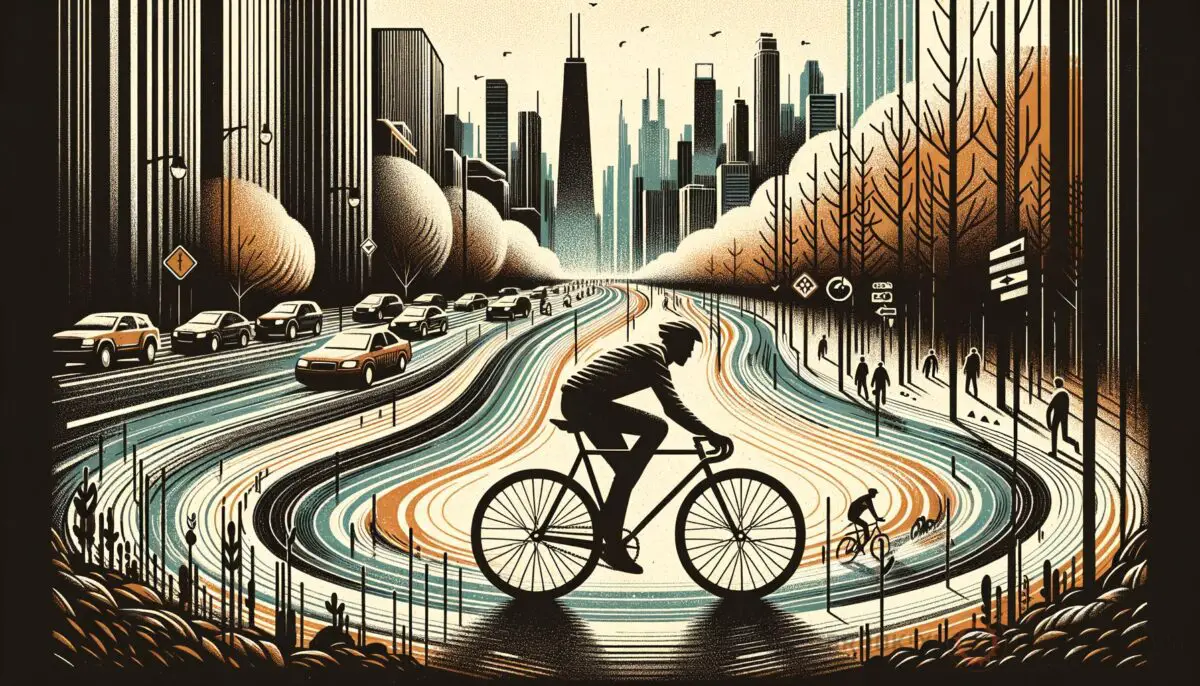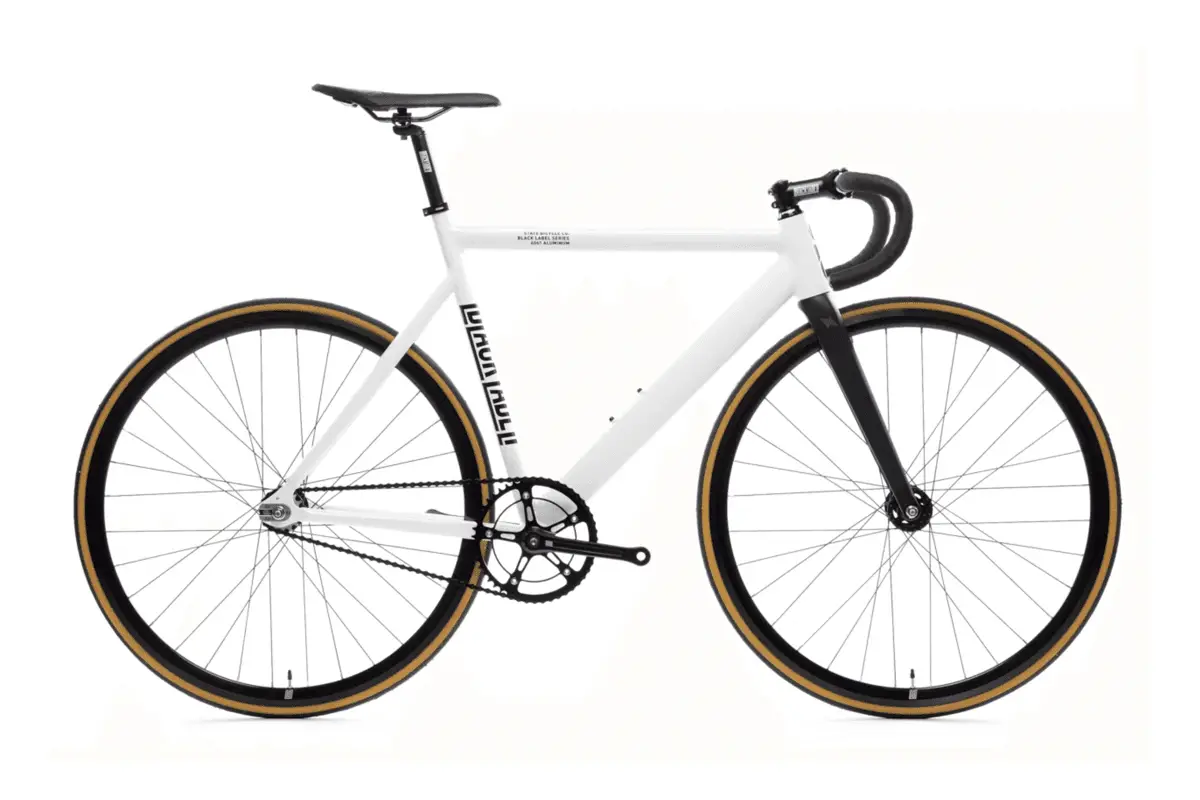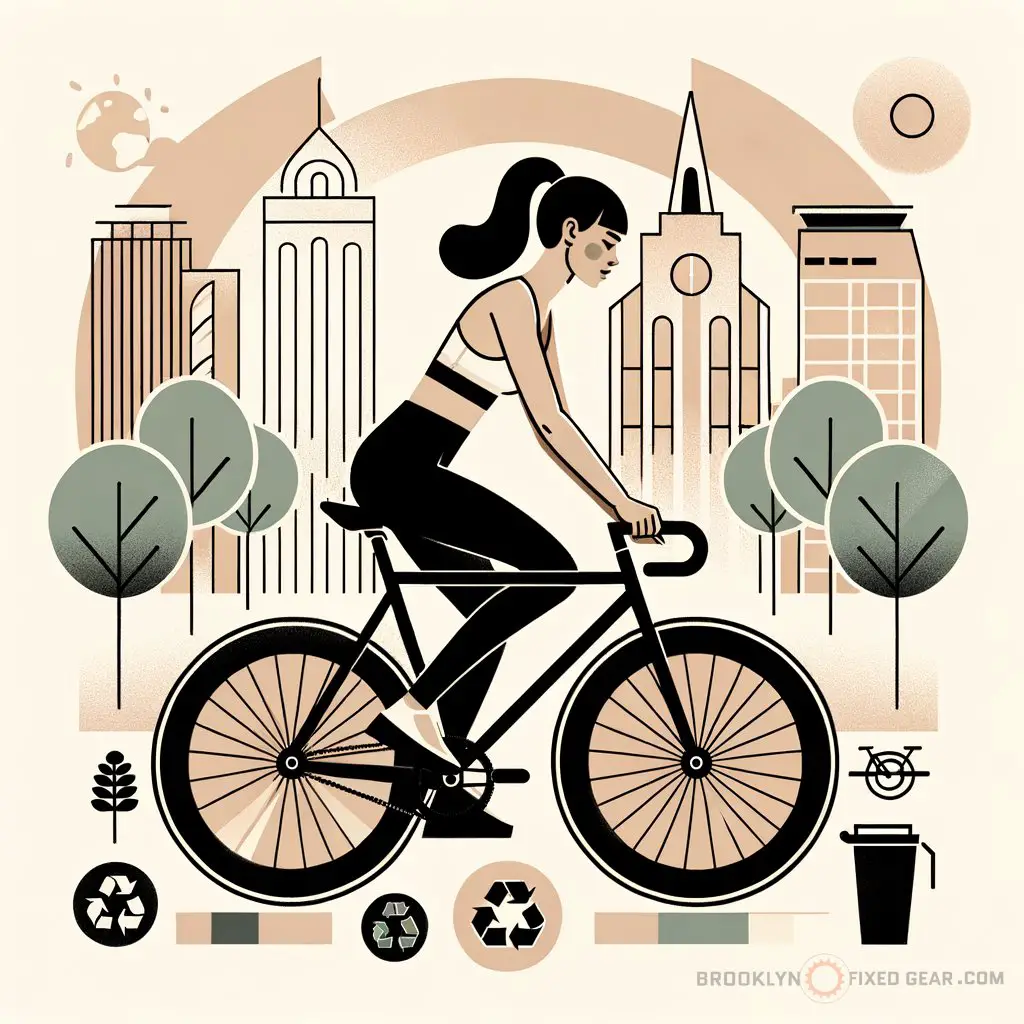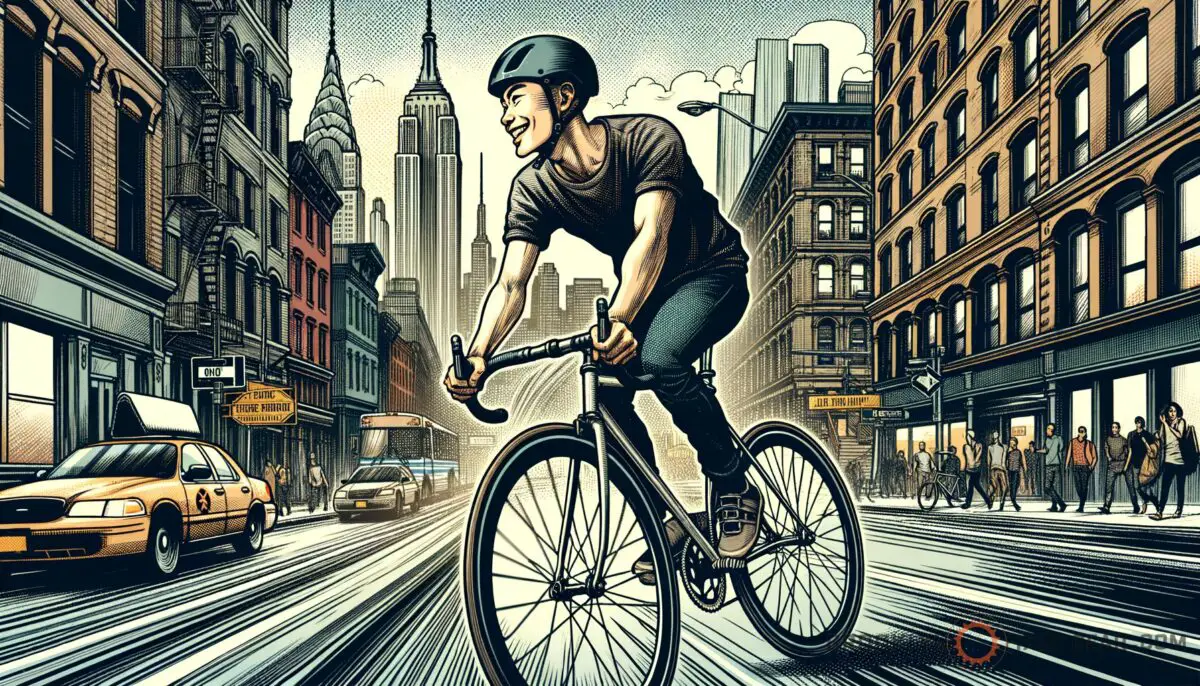Ever pedaled through the bustling streets of the Big Apple on a sleek fixie, feeling that unique blend of freedom and control?If you’re seeking a harmonious ride connecting you both to the urban fabric and the ideals of sustainable living, have you considered the “ethical considerations of cycling“?Stick with me to discover how your love for fixed-gear biking can be a path to a greener lifestyle.
We’ll zoom into how cycling transcends transportation and becomes a statement of living sustainably.
Key takeaways
- Cycling significantly reduces carbon footprint and promotes sustainable cities.
- Mindful consumption and community engagement are key spokes in the sustainability wheel.
- Despite its advantages and challenges, cycling is a powerful statement of eco-friendly living.
How does cycling align with eco-friendly choices?
Cycling, especially when mounted on a smooth-riding fixie, is more than a mode of transport – it’s a philosophy, a commitment to pedal power over fossil fuels.And as a committed cyclist, you’ve got to know that every time you opt for two wheels, you’re not just taking care of your health but also nurturing the planet.Let’s dive into the ethical gears of cycling and how they mesh with the larger cog of sustainable living.

1. Reducing carbon footprints
One of the most immediate ways cycling promotes sustainability is through its low environmental impact.Bikes emit no greenhouse gases once you’ve got them running, making them far friendlier to our atmosphere than cars.By choosing to ride a track bike to your destination, you contribute to decreased air pollution and a significant reduction in your own carbon footprint.
A simple choice that’s not only good for you but great for our Earth!
“Cycling, especially when mounted on a smooth-riding fixie, is more than a mode of transport – it’s a philosophy, a commitment to pedal power over fossil fuels.By choosing to ride a track bike to your destination, you contribute to decreased air pollution and a significant reduction in your own carbon footprint.”
Moreover, when talking about fixies, the simplicity of design from the best fixie bikes means less manufacturing resources are used up initially and fewer replacement parts are needed down the line.This equates to a lesser demand on natural resources and reduced waste.
2. Promoting sustainable cities
Cycling helps in creating more livable urban environments.As cities embrace bike friendly infrastructure, they see a dip in traffic congestion, a boon for reducing city-wide emission levels.More bikes can lead to a reimagining of our city spaces, prioritizing people and community over vehicles.

Besides this, cycling advocates also push for greener urban planning.This may include more public spaces like what you’d find at a bike polo court, where the community can engage in healthy activities, fostering a sense of togetherness and encouraging a sustainable lifestyle.
3. Encouraging mindful consumption
Riding a fixed-gear bike nurtures a mindset of minimalism.Since fixies thrive on simplicity – no gears, no fancy parts – they naturally steer you away from the consumerist tendency to buy more than you need.This pared-down approach leads to reduced consumption and waste, an ethical choice that buffers our planet against the effects of overconsumption.
Part of mindful consumption is also engaging with sustainable brands and considering how to choose a bike saddle or other components that are ethically produced and sourced.This awareness and deliberation in consumption are major cogs in the wheel of sustainable living.
4. Supporting physical health and well-being
Health is wealth, as the saying goes, and cycling is a veritable treasury.Fixie riders experience intense cardio workouts that bolster heart health, improve muscle tone, and boost overall fitness, which can be especially effective as part of fixed-gear riding for seniors.By being fit, you’re less likely to rely on healthcare systems, thereby indirectly lessening your impact on resources.
Moreover, cycling can contribute to mental health, reducing stress and enhancing mood.This personal benefit ripples out to the community, as healthier people can mean more vibrant, active, and productive communities.
5. Cultivating community and culture
The cycling culture is grounded in community – from the thrill of brevets to the shared exuberance at cycling events.These experiences amplify the social aspects of sustainability, where shared values and collective action pave the road to change.Participating in these events emphasizes community over competition, solidarity over solitude.
In fact, the best cycling events of the year don’t just showcase physical prowess but also highlight issues such as environmentalism, promoting the exchange of (sustainable) ideas and practices.Engaging in these events reinforces the notion that we’re all in this ride together.
State Bicycle Co. Black Label 6061

State Bicycle Co. Black Label 6061
More cycling sustainability tips
Beyond the foundational steps, there are numerous tweaks and practices we can incorporate into our daily routines to further align our cycling habits with sustainable living principles.Here are several go-to strategies I’ve embraced over my years of urban cycling.
- Regularly maintain your bike to extend its lifespan; a well-tuned fixie not only rides smoother but also lasts much longer.
- Invest in durable, quality cycling gear from trusted sources to minimize the need for frequent replacements.
- Use bike multi-tools for DIY maintenance and repairs; this not only saves resources but also empowers you with the knowledge of your ride.
- Opt for locally-made cycling accessories to support local businesses and reduce transportation emissions.
- Attend workshops or courses on bike maintenance to enhance your self-sufficiency and connection with your bike.
When considering dos and don’ts, it’s worth bearing in mind the nuances of cycling ethics and sustainability:
| Do | Don’t |
|---|---|
| Use LED lights to enhance visibility and safety on the road. | Neglect the importance of helmet safety. |
| Incorporate cycling into your daily commute to reduce dependence on cars. | Ignore traffic laws and cyclist etiquette – always ride with respect. |
| Support community bike programs and initiatives. | Waste resources; conserve water and energy when cleaning or maintaining your bike. |
| Educate others about the benefits of cycling. | Shy away from advocating for better bike infrastructure in your city. |
Advantages and disadvantages of cycling for sustainable living
Adopting cycling as part of a sustainable lifestyle is like getting the best of both worlds: a healthy, cost-effective transit option that doubles as your daily workout.However, like any ride, it has its ups and downs.
Advantages
- Improves air quality: Bikes produce zero emissions while being ridden.
- Mitigates noise pollution: Compared to cars, bikes are virtually silent, creating a more peaceful urban soundscape.
- Reduces traffic congestion: More bikes can mean fewer cars on the road, helping to ease urban traffic snarls.
- Encourages efficient land use: Cycling infrastructure typically requires less space than that needed for vehicular traffic.
Disadvantages
- Infrastructure dependency: The benefits of cycling are significantly dampened without proper bike lanes and storage facilities.
- Weather limitations: Inclement weather can deter even the most seasoned cyclists.
- Physical demand: Cycling requires physical effort, which might not be feasible for everyone in all circumstances.
- Security concerns: Bike theft is a persistent issue, necessitating secure locks and potentially insurance.
In my personal, non-expert opinion, the culture of cycling is a testament to how a simple change in our daily routine can have a profound impact on not just our health, but on the world around us.Getting on a fixie isn’t just about getting from A to B; it’s about taking a stand for what you believe in—for cleaner air, quieter streets, and a more connected community.Throw in the bonus of staying fit, and it’s a win all around.
The fixed-gear lifestyle embodies this, stripping down to essentials and focusing on what’s really important.If you want to get a handle on which fixie suits your ethos and style, take a spin through the options for the best fixie bikes.
If you are a visual learner, check out this video titled ‘What do environmental sustainability and ethics mean at Pole Bicycles?’
Frequently asked questions (FAQ)
Is cycling really effective in reducing one’s carbon footprint?
Yes, cycling is extremely effective in reducing an individual’s carbon footprint, as bicycles produce no emissions unlike cars and motorcycles.Opting for a bike over a motor vehicle for daily commutes and errands can substantially decrease the amount of greenhouse gases you’re responsible for releasing into the atmosphere.
How does cycling support local economies?
Cycling can significantly support local economies by increasing the viability and visibility of local businesses.Cyclists are more likely to stop and shop at local stores than those driving by in cars, and cycling events usually attract participants and spectators who inject money into local businesses.
Can cycling be considered a form of activism?
Cycling can indeed be seen as a form of activism, particularly in urban areas where the act of choosing a bike over a car is a statement against dependence on fossil fuels.It’s a public demonstration of commitment to healthier lifestyles and sustainable city planning.
Final thoughts
Wrapping up, we’ve journeyed through the ethical landscape that cycling weaves into the fabric of sustainable living.The ride isn’t just a physical one, but it’s about pedaling through the metaphysical layers of our responsibility towards ourselves and the environment.Whether it’s through reducing carbon emissions or fostering a sense of community, cycling stands as a prominent spoke in the wheel of sustainability.
So, hop on your fixie, feel the heartbeat of the city beneath you, and know that with every pedal, you’re part of a bigger movement.
What do you think about the role of cycling in promoting a sustainable lifestyle?Do you see the bike as a tool for environmental change?I read and reply to every comment.
If you found this article helpful, share it with a friend, and check out my full blog for more tips and tricks on fixed-gear cycling.Thanks for reading and keep spinning those wheels towards a greener tomorrow!
















